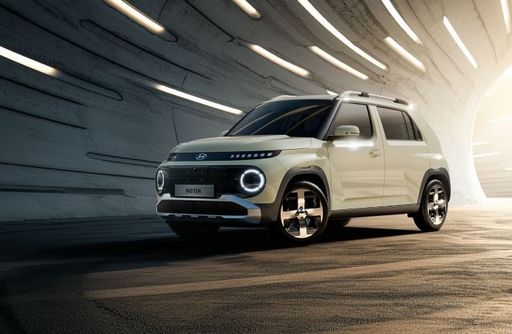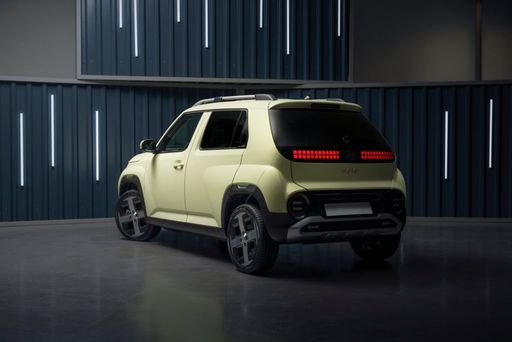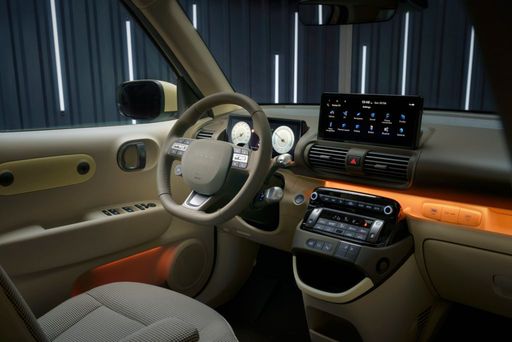Peugeot 208 vs Hyundai Inster - Differences and prices compared
Compare performance (156 HP vs 115 HP), boot space and price (20700 £ vs 20500 £ ) at a glance. Find out which car is the better choice for you – Peugeot 208 or Hyundai Inster?
Costs and Efficiency:
When it comes to price and running costs, the biggest differences usually appear. This is often where you see which car fits your budget better in the long run.
Hyundai Inster has a slight advantage in terms of price – it starts at 20500 £ , while the Peugeot 208 costs 20700 £ . That’s a price difference of around 197 £.
In terms of energy consumption, the advantage goes to the Peugeot 208: with 14.10 kWh per 100 km, it’s barely noticeable more efficient than the Hyundai Inster with 14.30 kWh. That’s a difference of about 0.20 kWh.
As for electric range, the Peugeot 208 performs slightly better – achieving up to 432 km, about 62 km more than the Hyundai Inster.
Engine and Performance:
Under the bonnet, it becomes clear which model is tuned for sportiness and which one takes the lead when you hit the accelerator.
When it comes to engine power, the Peugeot 208 has a noticeable edge – offering 156 HP compared to 115 HP. That’s roughly 41 HP more horsepower.
In acceleration from 0 to 100 km/h, the Peugeot 208 is evident quicker – completing the sprint in 8.30 s, while the Hyundai Inster takes 10.60 s. That’s about 2.30 s faster.
There’s also a difference in torque: Peugeot 208 pulls convincingly stronger with 270 Nm compared to 147 Nm. That’s about 123 Nm difference.
Space and Everyday Use:
Beyond pure performance, interior space and usability matter most in daily life. This is where you see which car is more practical and versatile.
Seats: Peugeot 208 offers slightly more seating capacity – 5 vs 4.
In curb weight, Peugeot 208 is somewhat lighter – 1165 kg compared to 1380 kg. The difference is around 215 kg.
In terms of boot space, the Peugeot 208 offers noticeable more room – 352 L compared to 280 L. That’s a difference of about 72 L.
When it comes to payload, Peugeot 208 slightly takes the win – 430 kg compared to 357 kg. That’s a difference of about 73 kg.
Who wins the race in the data check?
The Peugeot 208 holds a decisive overall lead in the objective data comparison.
This result only shows which model scores more points on paper – not which of the two cars feels right for you.
Costs and Consumption
View detailed analysis
Engine and Performance
View detailed analysis
Dimensions and Body
View detailed analysis

Peugeot 208
Peugeot 208
The Peugeot 208 feels like a city-savvy fox: compact, stylish and surprisingly grown-up, with a cabin that punches above its weight and enough personality to make daily commutes a little less boring. It’s a smart pick for buyers who want chic practicality without the showroom bluster — easy to park, thrifty to run and oddly fun when the road tightens up.
details



Hyundai Inster
The Inster has quickly captured the attention of automotive enthusiasts with its striking design and dynamic performance. This model seamlessly blends advanced technology with comfort, making it an ideal choice for both daily commutes and adventurous road trips. With its spacious interior and innovative features, the Inster promises an exhilarating driving experience that doesn’t compromise on practicality.
details


Costs and Consumption |
|
|---|---|
|
Price
20700 - 35200 £
|
Price
20500 - 25800 £
|
|
Consumption L/100km
4.5 - 5.2 L
|
Consumption L/100km
-
|
|
Consumption kWh/100km
14.1 - 15.4 kWh
|
Consumption kWh/100km
14.3 - 15.1 kWh
|
|
Electric Range
362 - 432 km
|
Electric Range
327 - 370 km
|
|
Battery Capacity
46 - 51 kWh
|
Battery Capacity
-
|
|
co2
0 - 117 g/km
|
co2
0 g/km
|
|
Fuel tank capacity
44 L
|
Fuel tank capacity
-
|
Dimensions and Body |
|
|---|---|
|
Body Type
Hatchback
|
Body Type
SUV
|
|
Seats
5
|
Seats
4
|
|
Doors
5
|
Doors
-
|
|
Curb weight
1165 - 1530 kg
|
Curb weight
1380 - 1433 kg
|
|
Trunk capacity
309 - 352 L
|
Trunk capacity
238 - 280 L
|
|
Length
4055 mm
|
Length
-
|
|
Width
1745 mm
|
Width
1610 mm
|
|
Height
1430 mm
|
Height
-
|
|
Max trunk capacity
1118 - 1163 L
|
Max trunk capacity
-
|
|
Payload
380 - 430 kg
|
Payload
317 - 357 kg
|
Engine and Performance |
|
|---|---|
|
Engine Type
Petrol, Electric, Petrol MHEV
|
Engine Type
Electric
|
|
Transmission
Manuel, Automatic
|
Transmission
Automatic
|
|
Transmission Detail
Manual Gearbox, Reduction Gearbox, Dual-Clutch Automatic
|
Transmission Detail
Reduction Gearbox
|
|
Drive Type
Front-Wheel Drive
|
Drive Type
Front-Wheel Drive
|
|
Power HP
101 - 156 HP
|
Power HP
97 - 115 HP
|
|
Acceleration 0-100km/h
8.3 - 10.9 s
|
Acceleration 0-100km/h
10.6 - 11.7 s
|
|
Max Speed
150 - 200 km/h
|
Max Speed
-
|
|
Torque
205 - 270 Nm
|
Torque
147 Nm
|
|
Number of Cylinders
3
|
Number of Cylinders
-
|
|
Power kW
74 - 115 kW
|
Power kW
71 - 85 kW
|
|
Engine capacity
1199 cm3
|
Engine capacity
-
|
General |
|
|---|---|
|
Model Year
2023 - 2025
|
Model Year
2025
|
|
CO2 Efficiency Class
D, A, C
|
CO2 Efficiency Class
A
|
|
Brand
Peugeot
|
Brand
Hyundai
|
What drive types are available for the Peugeot 208?
The Peugeot 208 is offered with Front-Wheel Drive.




